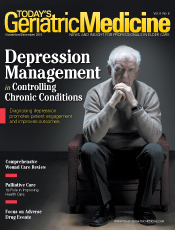
November/December 2015
November/December 2015

Departments
From the Editor
Year's End Observances
Clinical News
Music Therapy in Cardiovascular Patients
Medication Monitor
Focus on Adverse Drug Events
Nutrition
MIND Diet May Oppugn Cognitive Decline
Innovations in Geriatrics
Remote Monitoring in Geriatric Care
Long Term Care
Promoting Nursing in Assisted Living Facilities
Vintage Voices
Saturated Fat: Friend or Foe?
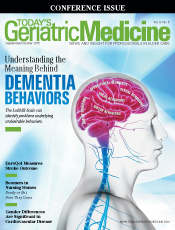
September/October 2015
September/October 2015

-
Understanding the Meaning Behind Dementia Behaviors
Without identifying the meaning of dementia patients' behaviors, health care teams struggle to create appropriate nonpharmacological interventions that properly address patients' needs. The LuBAIR Scale can help to identify problems underlying undesirable behaviors.
-
Boomers in Nursing Homes: Ready or Not, Here They Come
From considerations regarding drugs, sex, rebellion, and rock and roll to end-of-life care issues, baby boomers will challenge long term care facilities to institute new policies.
-
Gender Differences Are Significant in Cardiovascular Disease
Providers' recognition of gender-specific aspects of cardiovascular disease and implementation of efforts to provide information to boost women's awareness of its symptoms and dangers are key to improving women's heart disease mortality rates.
-
EuroQol Measures Stroke Outcome
The EuroQol assessment provides meaningful information about stroke survivors' perceptions of resulting stroke-related physical deficits and their own quality of life.
Departments
From the Editor
Managing Dementia Behaviors
Medication Monitor
Poststroke Depression
Alzheimer's Update
Brain Inflammation and Outcomes in Alzheimer's Disease
Clinical News
Preventing Burn Trauma
Research Review
Pseudohypogonadism: Making Men Believe They Need Testosterone
Datebook
Fall Risk Showcase
Vintage Voices
Are Computers Supplanting Physicians' Face Time?
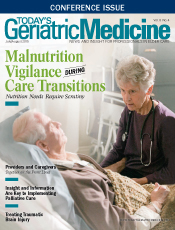
July/August 2015
July/August 2015

- Malnutrition Vigilance During Care Transitions
Physical and psychosocial changes in older adults can lead to significant reductions in oral intake. Physicians must identify diagnostic criteria that signal elders' increased risk of malnutrition, particularly during transitions of care.
- Insight and Information Are Key to Implementing Palliative Care
One of the fastest growing fields in medicine, palliative care focuses on a patient's quality of life, providing treatment through all the challenges of his or her clinical course.
- Treating Traumatic Brain Injury
Speech-language pathologists help patients to develop compensatory strategies for attention/memory/reasoning impairments following brain injury, which often occurs as a result of falls. Speech-language therapists also train caregivers to assist patients with implementing these strategies.
- Providers and Caregivers: Together on the Front Lines
Caring for a family member requires a partnership between physicians and patients' caregivers to meet the specialized challenges to family caregivers. Physicians must familiarize themselves with basic information to provide to caregivers seeking resources and solutions.
Departments
From the Editor
Enhancing the Discharge Process
Medication Monitor
Tramadol Safety Concerns
Nutrition
The MIND Diet: Fighting Dementia With Food
Long Term Care
Communication: Key to Better Care
Datebook
Education Spotlight
Vintage Voices
Demographic Realities in US Health Care
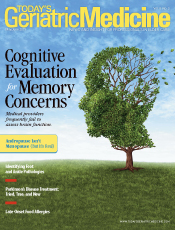
May/June 2015
May/June 2015

-
Cognitive Evaluation for Memory Concerns
Many older adults fail to receive a clinical cognitive evaluation from a medical provider despite the reduced costs and the extension of a patient's time in the community an early dementia diagnosis offers.
-
Andropause Isn't Menopause — But It's Real
Physicians must recognize which patients are good candidates for testosterone replacement therapy as well as the associated risks and benefits of the treatment.
-
Parkinson's Disease Treatment: Tried, True, and New
Amid Parkinson's disease patients' physical limitations, financial costs, and emotional fallout, treatments hold some promise for symptom management and slowing disease progression.
-
Identifying Foot and Ankle Pathologies
Many lower-extremity conditions can lead to physical decompensation, depression, falls, infection, and complications as severe as amputation.
Departments
From the Editor
The Most Difficult Task?
Medication Monitor
Rate Control Drugs in Atrial Fibrillation
Nutrition
Late-Onset Food Allergies
Alzheimer's Update
Dementia and Inappropriate Sexual Behavior
Clinical News
Managing Frailty Syndrome
Datebook
Vintage Voices
Optimizing Stroke Survivors' Quality of Life
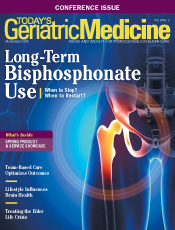
March/April 2015
March/April 2015

-
Long-Term Bisphosphonate Use: When to Stop? When to Restart?
Duration of bisphosphonate treatment and possible discontinuation should be personalized for patients based on their response to treatment, fracture risk, and comorbidities.
-
Team-Based Care Optimizes Outcomes
Coordinated communication among care team members ensures that patient care decisions consider input from clinical specialists, expedited service delivery, and cost-effective strategies.
-
Lifestyle Influences Brain Health
As baby boomers age, more emphasis than ever is being placed on brain health to combat Alzheimer's disease and other forms of dementia. The article examines brain games' effectiveness and outlines a memory program used to improve brain fitness.
-
Treating the Elder Life Crisis
Elder life crisis, which often manifests in older patients in their later years, is characterized by feelings of loneliness, helplessness, and boredom. Physicians must learn to identify and address the condition.
Departments
From the Editor
Focusing on Individualized Treatment
Medication Monitor
Treating Hypertension
Innovations in Geriatrics
Developing an Assisted Living Practice
Clinical News
Obstructive Sleep Apnea Disrupts Elders' Sleep
Long Term Care
Embracing Residents' Sexuality
Spring Product and Service Showcase
Datebook
Vintage Voices
Alzheimer's Research Comes of Age
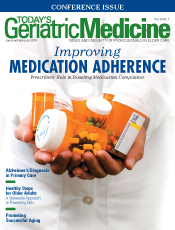
January/February 2015
January/February 2015

-
Improving Medication Adherence
Physicians must be proactive in combating medication nonadherence, which results in an estimated total of increased direct and indirect costs of $290 billion per year in avoidable medical spending and lost work productivity.
-
Alzheimer's Diagnosis in Primary Care
The National Institute on Aging—Alzheimer's Association guidelines provide clarity to primary care physicians regarding the diagnosis and treatment approach for patients with Alzheimer's disease and highlight the need for regular follow-up and management.
-
Physicians Promote Successful Aging
Physicians contribute to objective successful aging by providing good treatment and helping patients maintain good health and avoid illness, but health care providers typically pay inadequate attention to behavioral health issues.
-
Healthy Steps for Older Adults: A Statewide Approach to Preventing Falls
The evidence-based, low-cost, community-based fall risk screening and education program for adults aged 60 and older has been offered through the Pennsylvania Area Agencies on Aging network of senior centers.
Departments
From the Editor
Time to Treat Medication Nonadherence
Medication Monitor
Behavioral Expressions in Dementia Patients
Alzheimer's Update
Music and Art in Memory Care
Innovations in Geriatrics
Frozen Fecal Microbiota Capsules Treat C Diff
Datebook
Vintage Voices
Fracture Follow-Up |

